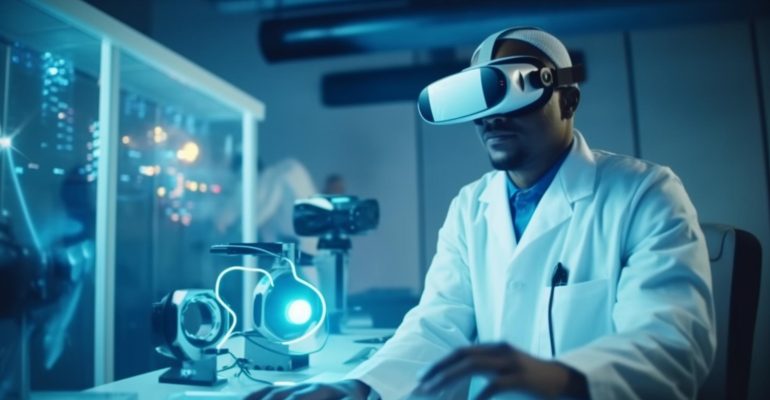Virtual Reality in Healthcare: Advancements and Applications

Virtual Reality in Healthcare: Advancements and Applications
The intersection of healthcare and technology has brought about remarkable innovations, and one of the most promising developments in recent years is the use of Virtual Reality (VR). While VR was once primarily associated with gaming and entertainment, it has found a profound and transformative role within the healthcare industry. In this blog post, we’ll explore the advancements and applications of virtual reality in healthcare.
Understanding Virtual Reality in Healthcare
Virtual reality involves creating a computer-generated environment that users can interact with, often using a headset or goggles. In healthcare, VR takes on a different role, aiming to improve patient outcomes, enhance medical training, and provide therapeutic interventions.
Medical Training and Education
One of the most notable applications of VR in healthcare is medical training and education. Medical professionals, including surgeons, nurses, and students, are benefiting from immersive simulations that allow them to practice complex procedures in a risk-free environment. These simulations provide a safe space to hone their skills and enhance their expertise.
For example, surgeons can rehearse surgeries in a virtual environment before entering the operating room, reducing the margin for error and improving patient safety. Medical students can explore 3D anatomical models, gaining a deeper understanding of the human body’s intricacies.
Pain Management and Rehabilitation
VR has also emerged as a powerful tool for managing pain and aiding in rehabilitation. Patients undergoing painful procedures or recovering from injuries can immerse themselves in virtual environments that divert their attention from discomfort. This distraction can reduce the perception of pain and anxiety, ultimately leading to more comfortable experiences.
Furthermore, VR-based rehabilitation programs have proven effective in improving motor skills, mobility, and cognitive function. Stroke survivors, for instance, can engage in VR-assisted exercises that promote recovery and enhance their quality of life.
Mental Health and Therapy
Mental health is another area where VR is making a significant impact. Virtual reality therapy is used to treat conditions such as post-traumatic stress disorder (PTSD), phobias, anxiety disorders, and even depression. Patients can confront and process their fears or traumatic experiences in a controlled and immersive environment, gradually reducing their symptoms.
Patient Engagement and Distraction
VR is being used as a means of engaging patients during hospital stays or medical procedures. It can transport patients to calming, enjoyable, or educational environments, reducing stress and anxiety associated with hospitalization. Children, in particular, benefit from VR distractions during medical procedures, making the experience less daunting.
Challenges and Future Prospects
While the potential of VR in healthcare is immense, it’s not without challenges. High-quality VR equipment can be costly, and not all healthcare settings have the resources to implement VR solutions. Moreover, ensuring the privacy and security of patient data within VR environments is crucial.
The future of VR in healthcare looks promising, with ongoing research and development into more affordable and accessible VR solutions. As technology advances, we can expect to see even more innovative applications in diagnostics, telemedicine, and long-term care.
In conclusion, virtual reality is not just a tool for entertainment; it’s a transformative force in healthcare. It is revolutionizing medical training, aiding in pain management, supporting mental health treatment, and enhancing patient experiences. As VR technology continues to evolve, its impact on healthcare will only become more profound, offering new possibilities for improved patient care and medical advancements.
The journey of virtual reality in healthcare is just beginning, and its potential to revolutionize the industry is nothing short of extraordinary. Contact us to get started.


